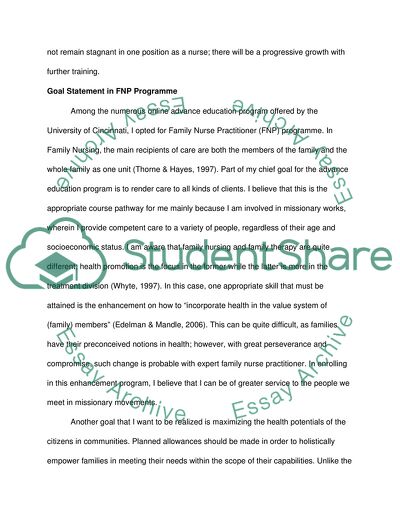
- Home
- Free Samples
- Premium Essays
- Editing Services
- Extra Tools
- Essay Writing Help
- About Us
- Studentshare
- Subjects
- Miscellaneous
- Goal/personal statement for graduate school (fmaily nurse practitioner) FNP
Goal/personal statement for graduate school (fmaily nurse practitioner) FNP - Essay Example

- Subject: Miscellaneous
- Type: Essay
- Level: Undergraduate
- Pages: 4 (1000 words)
- Downloads: 0
- Author: rohanpablo
Extract of sample "Goal/personal statement for graduate school (fmaily nurse practitioner) FNP"
Consequently, nurses have to take into account the impact of the environment in maximum care functions, for it can either serve as reinforcing or weakening factor during the provisions of health promotion and intervention. At this point, the practice in nursing is highly diversified, and requires continued education and skills enhancement to keep up with rapid turnovers in scientific researches and discoveries. As a nurse practitioner myself, I recognize the significance of evidenced-based practice in nursing.
In order to gain a wider perspective in the nursing field, a nursing enrichment process must be undertaken, thus, the engagement in advance education program. As a developing nurse, I know that this process is essential in keeping myself updated and more efficient. The continuation in education signifies that I am prepared both physically and psychologically in accepting the challenges accompanying such comprehensive lessons and training. In this way, I will not remain stagnant in one position as a nurse; there will be a progressive growth with further training.
Among the numerous online advance education program offered by the University of Cincinnati, I opted for Family Nurse Practitioner (FNP) programme. In Family Nursing, the main recipients of care are both the members of the family and the whole family as one unit (Thorne & Hayes, 1997). Part of my chief goal for the advance education program is to render care to all kinds of clients. I believe that this is the appropriate course pathway for me mainly because I am involved in missionary works, wherein I provide competent care to a variety of people, regardless of their age and socioeconomic status.
I am aware that family nursing and family therapy are quite different; health promotion is the focus in the former while the latter is more in the treatment division (Whyte, 1997). In this case, one appropriate skill that must be attained is the enhancement on how to “incorporate health in the
...Download file to see next pages Read More
- TERMS & CONDITIONS
- PRIVACY POLICY
- COOKIES POLICY